Elaris Caro VS Hyundai i10 – Specs, Efficiency & Price Comparison
Which model is the better choice – the Elaris Caro or the Hyundai i10? We compare performance ( vs 90 HP), boot capacity ( vs 252 L), efficiency ( vs 4.90 L), and of course, the price ( vs 14600 £).
Find out now which car fits your needs better!
The Elaris Caro () is powered by a engine and comes with a transmission. In comparison, the Hyundai i10 (Hatchback) features a Petrol engine and a Manuel or Automatic gearbox.
When it comes to boot capacity, the Elaris Caro offers , while the Hyundai i10 provides 252 L – depending on what matters most to you. If you’re looking for more power, you’ll need to decide whether the of the Elaris Caro or the 90 HP of the Hyundai i10 suits your needs better.
There are also differences in efficiency: vs 4.90 L. In terms of price, the Elaris Caro starts at , while the Hyundai i10 is available from 14600 £.
Compare all the key specs now and find out which model fits your lifestyle best!
Elaris Caro
The Elaris Caro is a standout in the world of electric vehicles, combining advanced technology with sleek design. Its futuristic interior caters to both comfort and connectivity, providing an exceptional driving experience. This vehicle represents a significant step forward in eco-friendly transport, demonstrating the brand's commitment to innovation and sustainability.
detailsHyundai i10
The Hyundai i10 impresses with its compact design, making it an ideal choice for navigating through busy urban environments. Its interior is surprisingly spacious, offering drivers and passengers comfort beyond what one might expect from a city car. The model combines efficiency and practicality, making it an attractive option for those seeking both economy and functionality in their daily commute.
details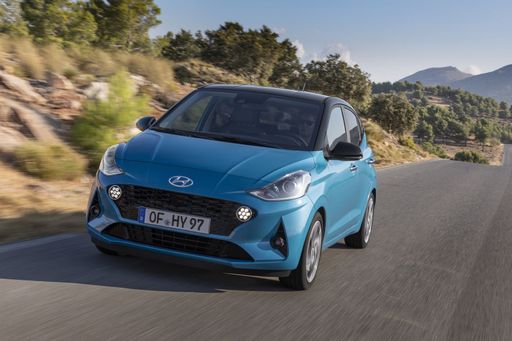 @ hyundai.news
@ hyundai.news
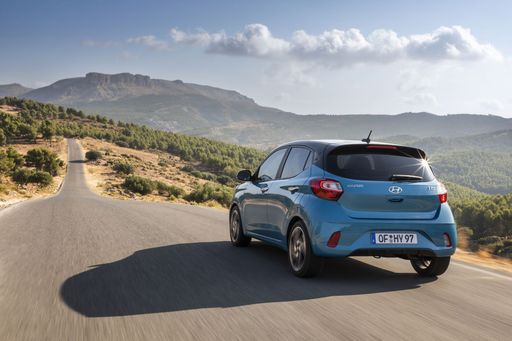 @ hyundai.news
@ hyundai.news
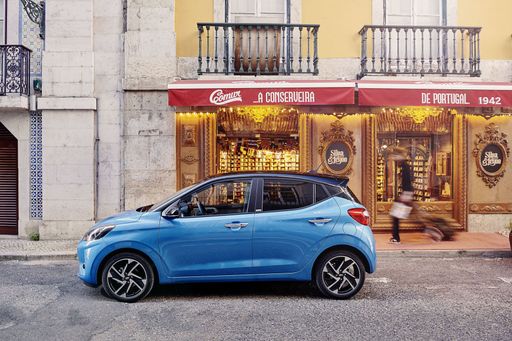 @ hyundai.news
@ hyundai.news
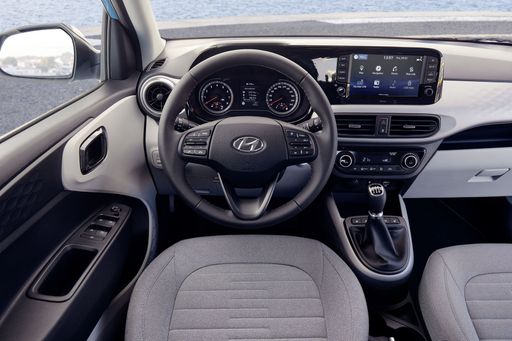 @ hyundai.news
@ hyundai.news
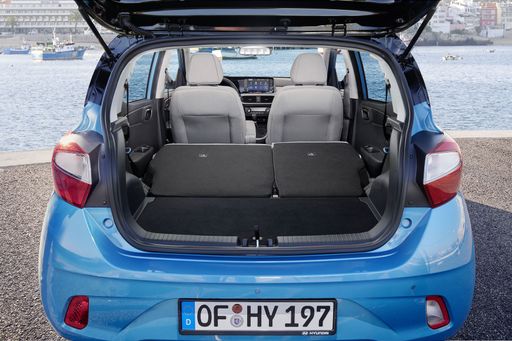 @ hyundai.news
@ hyundai.news

|
|
|
|
|
Costs and Consumption |
|
|---|---|
|
Price
-
|
Price
14600 - 19000 £
|
|
Consumption L/100km
-
|
Consumption L/100km
4.9 - 5.4 L
|
|
Consumption kWh/100km
-
|
Consumption kWh/100km
-
|
|
Electric Range
-
|
Electric Range
-
|
|
Battery Capacity
-
|
Battery Capacity
-
|
|
co2
-
|
co2
111 - 123 g/km
|
|
Fuel tank capacity
-
|
Fuel tank capacity
36 L
|
Dimensions and Body |
|
|---|---|
|
Body Type
-
|
Body Type
Hatchback
|
|
Seats
-
|
Seats
4 - 5
|
|
Doors
-
|
Doors
5
|
|
Curb weight
-
|
Curb weight
996 - 1099 kg
|
|
Trunk capacity
-
|
Trunk capacity
252 L
|
|
Length
-
|
Length
3670 - 3675 mm
|
|
Width
-
|
Width
1680 mm
|
|
Height
-
|
Height
1480 - 1483 mm
|
|
Payload
-
|
Payload
344 - 423 kg
|
Engine and Performance |
|
|---|---|
|
Engine Type
-
|
Engine Type
Petrol
|
|
Transmission
-
|
Transmission
Manuel, Automatic
|
|
Transmission Detail
-
|
Transmission Detail
Manual Gearbox, Automated Manual
|
|
Drive Type
-
|
Drive Type
Front-Wheel Drive
|
|
Power HP
-
|
Power HP
63 - 90 HP
|
|
Acceleration 0-100km/h
-
|
Acceleration 0-100km/h
11.4 - 18.4 s
|
|
Max Speed
-
|
Max Speed
143 - 175 km/h
|
|
Torque
-
|
Torque
93 - 172 Nm
|
|
Number of Cylinders
-
|
Number of Cylinders
3 - 4
|
|
Power kW
-
|
Power kW
46 - 66 kW
|
|
Engine capacity
-
|
Engine capacity
998 - 1197 cm3
|
General |
|
|---|---|
|
Model Year
-
|
Model Year
2024
|
|
CO2 Efficiency Class
-
|
CO2 Efficiency Class
C, D
|
|
Brand
-
|
Brand
Hyundai
|
Elaris Caro
The Elaris Caro: Redefining Electric Transport with Cutting-Edge Innovation
In the ever-evolving landscape of electric vehicles, the Elaris Caro emerges as a standout with its impressive mix of capability and innovation. As a transporter designed for modern needs, it combines exceptional engineering with advanced technology to offer a seamless driving experience.
Technical Brilliance: Power and Performance
The Elaris Caro defines itself with a robust 190 PS electric motor, equivalent to 140 kW, that sets it apart in the world of heavy-duty electric vehicles. Powered by a choice between two battery capacities, 105.7 kWh and 87.5 kWh, its range varies between 400 to 500 kilometres, making it suitable for both urban journeys and longer hauls.
One of the standout features is the instantaneous torque of 410 Nm, ensuring seamless acceleration and reliable performance, even when fully loaded. With a maximum speed of 100 km/h, it’s clear that the Caro is designed with urban efficiency and practicality in mind, rather than pure speed.
Innovative Design: Elegance Meets Practicality
Measuring a grand 5915 mm in length, the Caro is engineered not just for performance, but also for utility. With its spacious design, it comfortably accommodates two seats while maintaining an impressive 1090 kg payload capacity, making it ideal for commercial use.
The clean aerodynamic body is not just for aesthetics; it plays a vital role in optimising the vehicle’s efficiency, complemented by its CO2 emissions rating of zero grams per kilometre.
Advanced Technology: Features that Matter
The Caro is equipped with an automatic transmission and front-wheel drive system for effortless handling and operation. Its environmental credentials are underscored by a perfect CO2-efficiency class A, highlighting its eco-friendly construction and operation.
While traditional transporters focus merely on functionality, the Caro takes a leap forward by incorporating the latest electric driving technologies, ensuring both driver and environmental needs are met.
Practicality and Experience: The Elaris Promise
With its starting price between €71,975 and €79,990, the Elaris Caro is competitively priced in the electric transporter market. Its high-end features and reliability are paired with the promise of reduced operating costs and environmental impact, thanks to its all-electric powertrain.
The 2023 model is an evolution in the world of transporters, aspiring to reimagine what drivers expect from their vehicles. Whether its purpose is for personal use or business, the Caro is prepared to handle challenges with grace and effectiveness.
Hyundai i10
Introduction to the Hyundai i10
The Hyundai i10 has consistently proven to be a dependable and stylish companion for urban driving. Known for its compact design and efficiency, this hatchback offers a perfect blend of modern aesthetics and practicality, making it a popular choice for city dwellers and small families alike.
Performance and Efficiency
The Hyundai i10 is available with both manual and automatic transmissions, catering to various driving preferences. Engine power ranges from 63 to 90 PS, providing a versatile driving experience for both novice and seasoned drivers. The fuel consumption varies between an impressive 4.9 to 5.4 litres per 100 kilometres, fitting for those looking to minimise fuel costs while also reducing their carbon footprint.
Engine and Transmission
Equipped with a choice of 1.0-litre or 1.2-litre engines, the i10 offers up to 172 Nm of torque, ensuring lively performance. The models feature front-wheel-drive configurations, allowing for smooth handling and reliable road performance. The car excels in city driving but is equally capable on longer journeys.
Interior and Comfort
Despite its compact size, the Hyundai i10 does not compromise on interior space and comfort. It accommodates four to five occupants comfortably, offering sufficient legroom and headroom. Its flexible seating arrangement and a 252-litre boot make it ideal for both quick trips and weekend getaways.
Safety and Technology
Safety remains a priority with Hyundai, and the i10 is no exception. It comes equipped with multiple airbags, stability control, and advanced braking systems. Technology-wise, the i10 features a user-friendly infotainment system with smartphone connectivity, ensuring a pleasant and connected drive.
Design and Style
The Hyundai i10’s design is both modern and sleek, making it stand out in the compact hatchback segment. With a length ranging from 3670 to 3675 mm, a width of 1680 mm, and a height of 1480 to 1483 mm, the i10 strikes a perfect balance between style and functionality.
Affordable Pricing and Value
The i10 is available in several trims including the Select, N Line, and Prime, among others, with prices ranging from €16,990 to €22,190. Considering its features and low running costs — with monthly expenses estimated between €694 to €793 — the Hyundai i10 offers substantial value for those seeking an economical yet stylish hatchback.
Conclusion
The Hyundai i10 combines efficiency, modern design, and practicality in a compact package. Whether you are seeking a reliable city car or an economical daily driver, the Hyundai i10 is a strong contender worth considering in the compact car market of 2024.
The prices and data displayed are estimates based on German list prices and may vary by country. This information is not legally binding.
